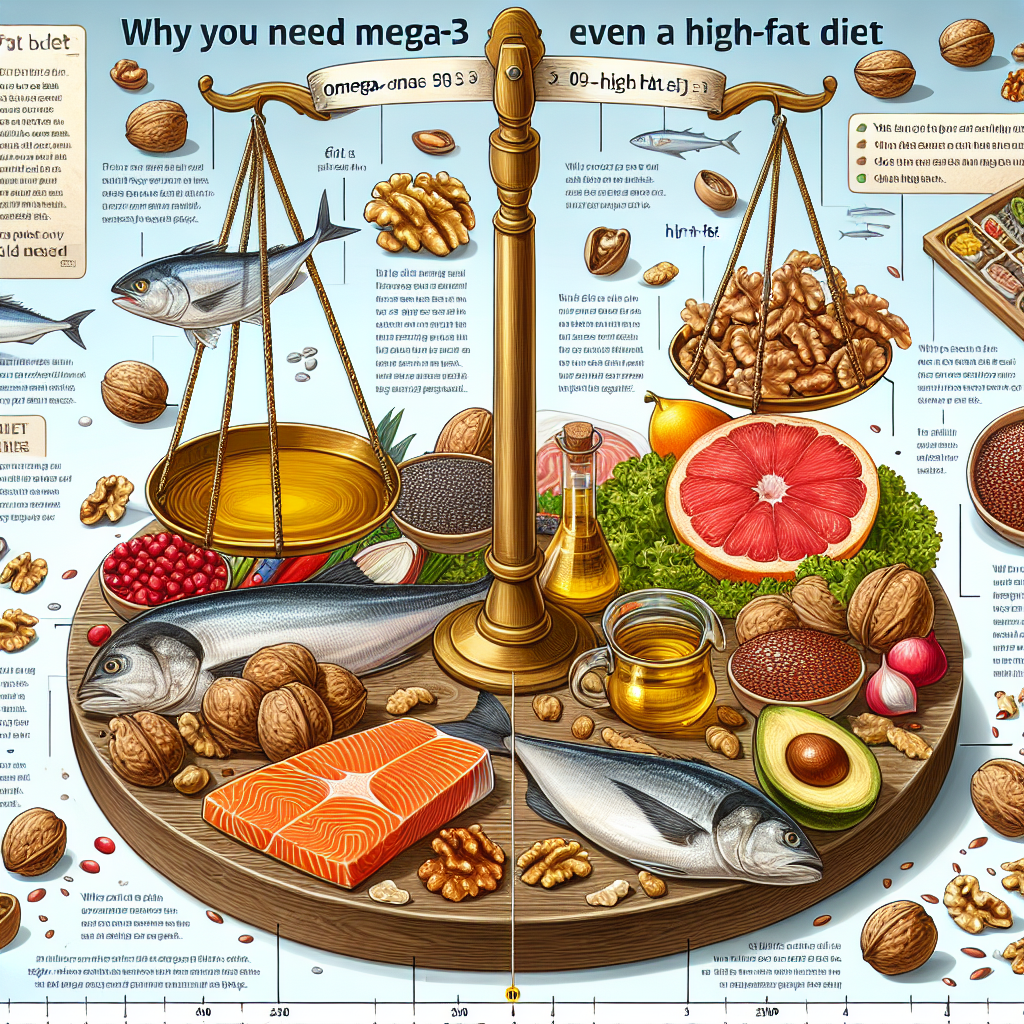Why You Need Omega-3 (Even on a High-Fat Diet)

Discover why Omega-3 is essential for your health, even on a high-fat diet. Learn about its numerous benefits, from boosting brain function to reducing inflammation. Don’t compromise on your health. Start incorporating Omega-3 into your diet today. Click here to learn more.
Understanding the Importance of Omega-3 in a High-Fat Diet
Omega-3 fatty acids are essential nutrients that play a crucial role in maintaining optimal health. They are particularly beneficial for heart health, brain function, and inflammation reduction. Despite their importance, the body cannot produce these fatty acids on its own, making it necessary to obtain them from dietary sources. Even on a high-fat diet, such as the ketogenic diet, the inclusion of Omega-3 is vital.
The ketogenic diet, popularly known as the keto diet, is a high-fat, low-carb diet that has gained significant attention for its potential to promote weight loss and improve certain health conditions. While this diet encourages a high intake of fats, it’s important to understand that not all fats are created equal. The type of fat consumed can significantly impact health outcomes. This is where Omega-3 fatty acids come into play.
Omega-3 fatty acids, specifically eicosapentaenoic acid (EPA) and docosahexaenoic acid (DHA), are polyunsaturated fats that are primarily found in fatty fish, flaxseeds, chia seeds, and walnuts. These fatty acids are known for their anti-inflammatory properties and their ability to lower the risk of heart disease. They also contribute to brain health, with research suggesting that they may reduce the risk of mental disorders like depression and dementia.
In the context of a high-fat diet, Omega-3 fatty acids can help balance the ratio of Omega-3 to Omega-6 fatty acids. The typical Western diet is often disproportionately high in Omega-6 fatty acids, which, when not balanced with Omega-3, can promote inflammation and contribute to chronic diseases. By incorporating Omega-3-rich foods or supplements into a high-fat diet, one can ensure a healthier balance of these essential fatty acids.
Moreover, Omega-3 fatty acids can enhance the benefits of a high-fat diet. For instance, they can help increase the level of high-density lipoprotein (HDL), also known as the “good” cholesterol, while reducing the level of low-density lipoprotein (LDL), or the “bad” cholesterol. This can contribute to improved heart health, which is particularly important given the high-fat nature of diets like the ketogenic diet.
Furthermore, Omega-3 fatty acids can support weight loss, a common goal of those following a high-fat diet. Research has shown that Omega-3 can help regulate body weight by improving metabolism and enhancing feelings of fullness. This can lead to a reduction in calorie intake and subsequent weight loss.
In conclusion, while a high-fat diet may seem at odds with the concept of consuming Omega-3 fatty acids, the reality is quite the contrary. Omega-3 fatty acids are not only compatible with a high-fat diet but can also enhance its benefits and mitigate potential risks. They can help maintain a healthy balance of fatty acids, support heart and brain health, and even aid in weight loss. Therefore, regardless of the type of diet one follows, the importance of Omega-3 fatty acids cannot be overstated. It is recommended to consult with a healthcare provider or a nutritionist to determine the appropriate amount of Omega-3 to incorporate into one’s diet.
The Essential Role of Omega-3 Fatty Acids in a High-Fat Diet

Omega-3 fatty acids are a type of polyunsaturated fat that is essential for our bodies to function optimally. They are considered essential because our bodies cannot produce them on their own, and therefore, we must obtain them from our diet. Even if you’re following a high-fat diet, such as the ketogenic diet, it’s crucial to ensure that you’re getting enough omega-3 fatty acids.
Omega-3 fatty acids play a vital role in many bodily functions. They are integral to the health of our cell membranes, which are responsible for protecting our cells and regulating what enters and exits them. Omega-3s also play a crucial role in brain health. They are a major component of the brain’s neurons, and a deficiency in omega-3s can lead to cognitive decline and mental health issues such as depression and anxiety.
Moreover, omega-3 fatty acids have potent anti-inflammatory properties. Chronic inflammation is a root cause of many diseases, including heart disease, cancer, and autoimmune disorders. By reducing inflammation, omega-3s can help protect against these diseases. They also support heart health by reducing triglycerides, lowering blood pressure, and preventing blood clots.
Despite the high-fat content of diets like the ketogenic diet, it’s possible to be deficient in omega-3s. This is because these diets often emphasize saturated fats found in foods like meat and dairy, which do not contain omega-3s. On the other hand, omega-3s are found in fatty fish, walnuts, flaxseeds, and chia seeds, which are not typically the focus of high-fat diets.
Therefore, even if you’re consuming a high amount of fat, it’s important to ensure that a portion of that fat is coming from omega-3-rich foods. If you’re finding it difficult to incorporate these foods into your diet, you may want to consider taking an omega-3 supplement.
However, it’s important to note that not all omega-3 supplements are created equal. Many supplements on the market are made from fish oil, which can be contaminated with toxins like mercury. It’s crucial to choose a high-quality, purified fish oil supplement, or consider a plant-based omega-3 supplement made from algae.
In conclusion, omega-3 fatty acids are an essential component of any diet, including high-fat diets. They play a crucial role in cell health, brain function, and inflammation reduction, and can help protect against a variety of diseases. Despite the emphasis on fat in high-fat diets, it’s possible to be deficient in omega-3s if you’re not consuming the right types of fat. Therefore, it’s important to ensure that you’re getting enough omega-3s, either through your diet or through supplementation. By doing so, you can support your overall health and wellbeing, regardless of the type of diet you follow.
Why Omega-3 is a Must-Have Even When Following a High-Fat Diet
Omega-3 fatty acids are essential nutrients that play a crucial role in maintaining optimal health. They are particularly beneficial for heart health, brain function, and inflammation reduction. Despite their importance, the body cannot produce these fatty acids on its own, making it necessary to obtain them from dietary sources. Even for those following a high-fat diet, such as the ketogenic diet, incorporating Omega-3 into your daily intake is a must.
The ketogenic diet, or keto diet, is a high-fat, low-carb diet that has gained popularity for its potential to promote weight loss and improve certain health conditions. While this diet encourages a high intake of fats, it’s important to note that not all fats are created equal. The type of fat you consume matters greatly, and this is where Omega-3 fatty acids come into play.
Omega-3 fatty acids are a type of polyunsaturated fat, which are considered healthy fats. They are different from saturated fats and trans fats, which are often associated with increased risk of heart disease and other health problems. Omega-3s, on the other hand, are known for their heart-healthy benefits. They can help lower blood pressure, reduce triglycerides, slow the development of plaque in the arteries, and reduce the likelihood of heart attack and stroke.
In addition to heart health, Omega-3 fatty acids also support brain health. They are a major component of the brain’s structure and function. Studies have shown that Omega-3s can improve cognitive function, reduce symptoms of mental health disorders, and even slow the progression of Alzheimer’s disease.
Moreover, Omega-3s have powerful anti-inflammatory properties. Chronic inflammation is linked to many serious diseases, including heart disease, cancer, and autoimmune disorders. By reducing inflammation, Omega-3s can help protect against these diseases.
Despite the high fat content of the ketogenic diet, it can be deficient in Omega-3s if not properly planned. Many foods that are high in Omega-3s, such as fatty fish, flaxseeds, and walnuts, are not typically included in the standard ketogenic diet. Therefore, it’s important to make a conscious effort to include these foods in your diet or consider taking an Omega-3 supplement.
Furthermore, the balance between Omega-3 and Omega-6 fatty acids in the diet is crucial. While both are essential, most Western diets are disproportionately high in Omega-6s, which can promote inflammation when not balanced with sufficient Omega-3s. The ketogenic diet, with its emphasis on high-fat foods, can easily fall into this pattern if not carefully managed.
In conclusion, even when following a high-fat diet like the ketogenic diet, it’s essential to ensure you’re getting enough Omega-3 fatty acids. They offer numerous health benefits, from heart and brain health to inflammation reduction. By consciously incorporating Omega-3-rich foods into your diet or considering a supplement, you can reap these benefits while still adhering to your high-fat dietary plan. Remember, it’s not just about the quantity of fat you consume, but also the quality.